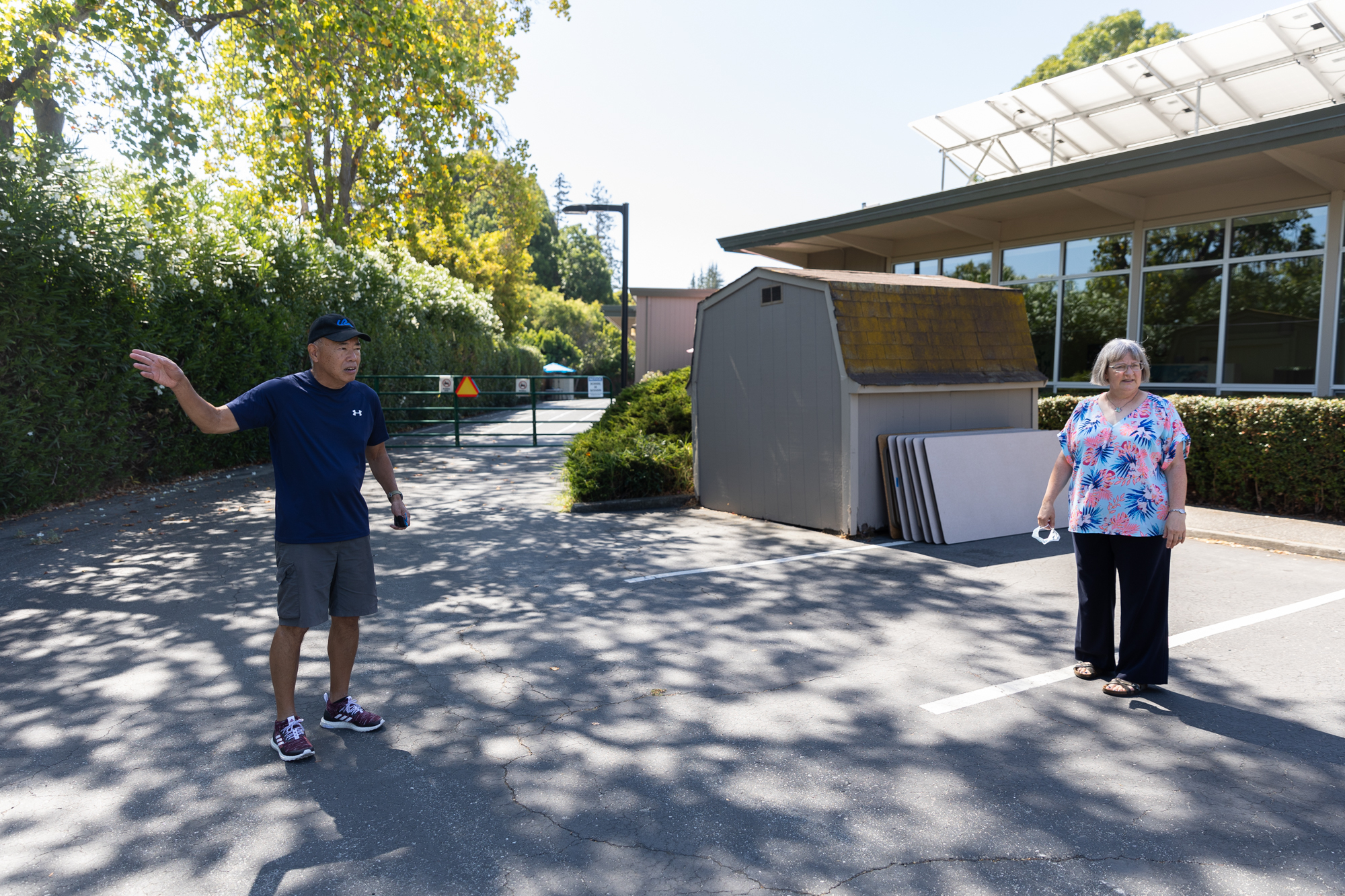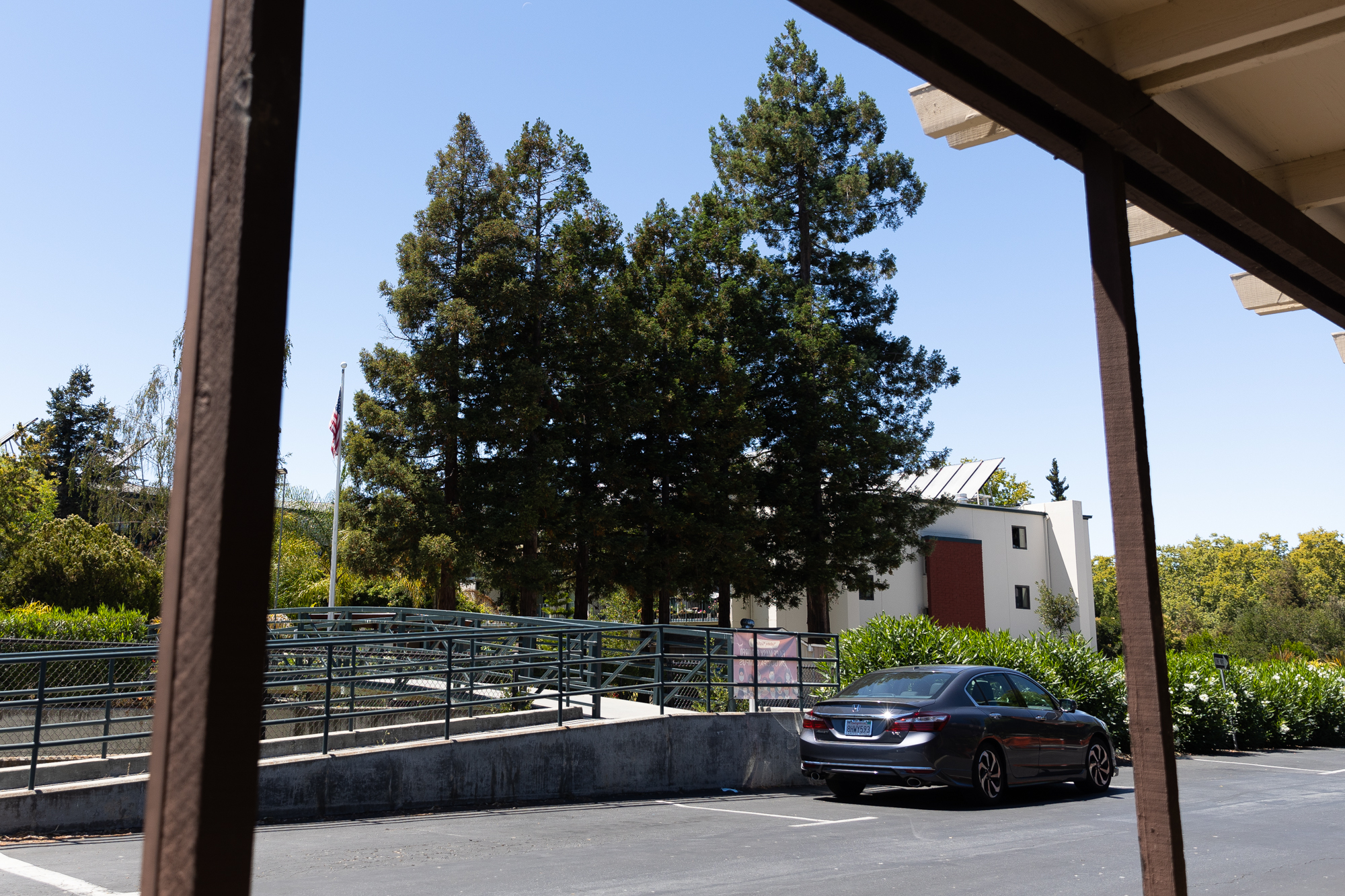When Palo Alto invited local churches to open their parking lots to people who live in their cars, city leaders and residents saw it as a modest solution to the colossal problem of homelessness.
While supporters saw it as a way to help the city's most vulnerable population, detractors worried about neighborhood impacts, including potential noise, trash and crime.
But after three years, the impacts of the new "safe parking" program appear to be relatively modest and entirely benign, according to city staff, program administrators and the congregations. Pleased with the early results, Palo Alto is now considering the program's next iteration. At a joint meeting on Wednesday Oct. 25, the city's Planning and Transportation Commission and the Human Relations Commission considered a proposal to turn the pilot program into a permanent one and relax some of the existing limits on safe parking lots.
According to city data, many of the spaces designated for "safe parking" remain unused. The newest entrant into the field, Etz Chayim, typically has about one car parked at its safe-parking lot, which opened in June of this year. The three congregations that preceded it – Highway Community, Unitarian Universalist Church and First Congregational Church have seen occupancy rates of 41.8%, 51.1% and 34.7% at their respective lots, according to a new report from the Department of Planning and Community Environment.
The report showed that between Jan. 1, 2021, and June 30, 2023, the three congregation lots served a total of 37 unique clients, with 21 participating in the Highway Community program and eight in each of the other two (Etz Chayim wasn't counted because it's so new). Of these, 17 clients received "positive placement" to housing after their stay in a safe parking program, according to MOVE Mountain View.
Christopher Kan, who chairs the safe parking committee at the Unitarian Universalist Church and who spearheaded the establishment of the program at the Charleston Road institution, said the church would like to see more participants. The demand, he noted, is certainly there. The outreach? Not so much.
Kan said he would like to see the city do more to educate unhoused residents about the availability of these programs.
"If you literally walk into any neighborhood in the city you will notice people living out of their cars," said Christopher Kan. "If you did a loop around Midtown or any neighborhood, you'll see that we can fill all of our lots several times over."
On the bright side, there hasn't been a single community complaint about any of the new safe-parking lots since the first program kicked off at the Highway Community lot in May 2021, according to the city and church leaders. The Rev. Eileen Altman, associate pastor at First Congregational Church, told this publication that there hadn't been any problems or surprises since the church's safe parking program kicked off 13 months ago.
The church has no contact with participants, Altman said, who only come to the lots to stay overnight and sleep.
City officials say other congregations have had similar experiences. Rachel Tanner, Palo Alto's former assistant planning director who is now coordinating the safe-parking program in her new role as manager specialist, said that the city hasn't received any negative comments about the safe parking lots.
"Trial period showed: no news is good news," she said "During the trial period, we haven't had any complaints, so we're feeling pretty confident."
Most congregations rarely notice the program participants, said Michael Love, whose organization, MOVE Mountain View, administers the program at the four congregation lots as well as at the larger city-owned site on Geng Road, which has spaces for 12 motorhomes or recreational vehicles.
"To the eye of the beholder they tend to be invisible because they … never seem to show up exactly at 7 p.m., or whenever the congregation lot is open. And they tend to leave as soon as they get up to do their business," Love said during the Oct. 25 hearing. "We have always experienced that there's not much interchange between car vehicle dwellers and host congregations."
Kan said his church has seen a wide range of participants, whose identities it keeps private.
"It's anyone you'd run into at Trader Joe's or at Palo Alto High. Everyone from young people to people with families or people who are on Social Security and had an unexpected emergency. It's all of the above," he said.
Both commissions agreed on Wednesday that the program is laudable and should be retained and expanded. That said, it grappled with three questions. Should some lots be allowed to modify more than four cars, which is the current limit? Should the city restrict safe-parking lots close to sites where such lots already exist? And should people with Palo Alto connections get preference for local safe-parking programs?
The lattermost question sparked a debate among planning commissioners, with some arguing against a Palo Alto preference and others supporting it. Commissioner Bart Hechtman was in the former camp and argued that congregations should have flexibility when it comes to whom they want to house on their lots.
"We all know this is not a Palo Alto problem. This is a national problem with regional impacts," Hechtman said. "Where our city limits end at the next city's beginning, I think that it's important to place as many of these unhoused people in a safe environment every night as we can in every city."
Commissioner George Lu disagreed and suggested that the lots could potentially provide higher benefits when they serve residents with local connections.
"This is maybe an abstract concern now while there is still plenty of capacity but it's likely that there could be just better outcomes for people across the entire system if people can have safe parking near their families, near communities that they've engaged in," Lu said.
While city staff proposed a list of preferences that includes people who attend Palo Alto Unified School District schools, people who lived or worked in Palo Alto and people with disabilities, the planning commission rejected that recommendation. It ultimately voted to limit the preference to people who go to Palo Alto schools, planning to check vehicle registrations at night, since they would face particularly significant disruption if they found themselves without local housing.
Vice Chair Bryna Chang and Commissioner Cari Templeton both made the case for including people with Palo Alto school connections on the preference list. Templeton said she knows people who lost their housing and had to scramble to find a place to live so that their children can remain in local schools.
"If you are unhoused suddenly, unexpectedly, and you're a student in PAUSD, it's very disruptive to get kicked out while your parents are trying to figure out how to secure new housing," Templeton said.
Commissioners also supported allowing congregations to include more than four cars per lot. Hechtman suggested a path in which a congregation can start out with a maximum of four cars and then increase it to six after a year of operation and to eight after two years. Residents near the congregation would have a chance to appeal any expansion of the existing program under his proposal.
Commissioners remained agnostic, however, on the question of whether safe parking lots should be allowed at two congregations in close proximity to one another. Rather than ruling on any buffer zones between such programs, they requested that planning staff perform additional analysis and create a map showing how many would be affected by a buffer zone of 600 feet or 1,200 feet.
The issue is particularly applicable to a stretch of Middlefield Road that includes a row of churches, including Highway Community. The Rev. Kaloma Smith, who chairs the Human Relations Commission and whose church, University AME Zion Church, is located on Middlefield, said he would support a buffer zone between such programs and suggested that the city consider looking at other types of locations for safe parking.
"We should look beyond faith institutions to expand," Smith said.




Comments